Analysis of Comparative Business Ethics and Social Responsibility
VerifiedAdded on 2022/11/15
|9
|1970
|219
Essay
AI Summary
This essay delves into the ethical considerations surrounding business practices, specifically focusing on the exploitation of workers within the supply chains of the supermarket company Coles. The essay highlights the concerns raised by organizations like the Australasian Centre for Corporate Responsibility (ACCR) regarding Coles' suppliers and their potential involvement in labor violations. It examines the application of ethical theories and moral principles, such as utilitarianism and the categorical imperative, to address the issue of worker exploitation and the need for increased supply chain transparency. The essay also discusses the role of stakeholders, ethical judgment frameworks, and the importance of moral philosophy in guiding ethical decision-making within organizations. The conclusion emphasizes the significance of ethical values and principles in ensuring a balance between stakeholder interests and business profitability, advocating for policy changes to prevent unethical practices like modern slavery in the supply chain.
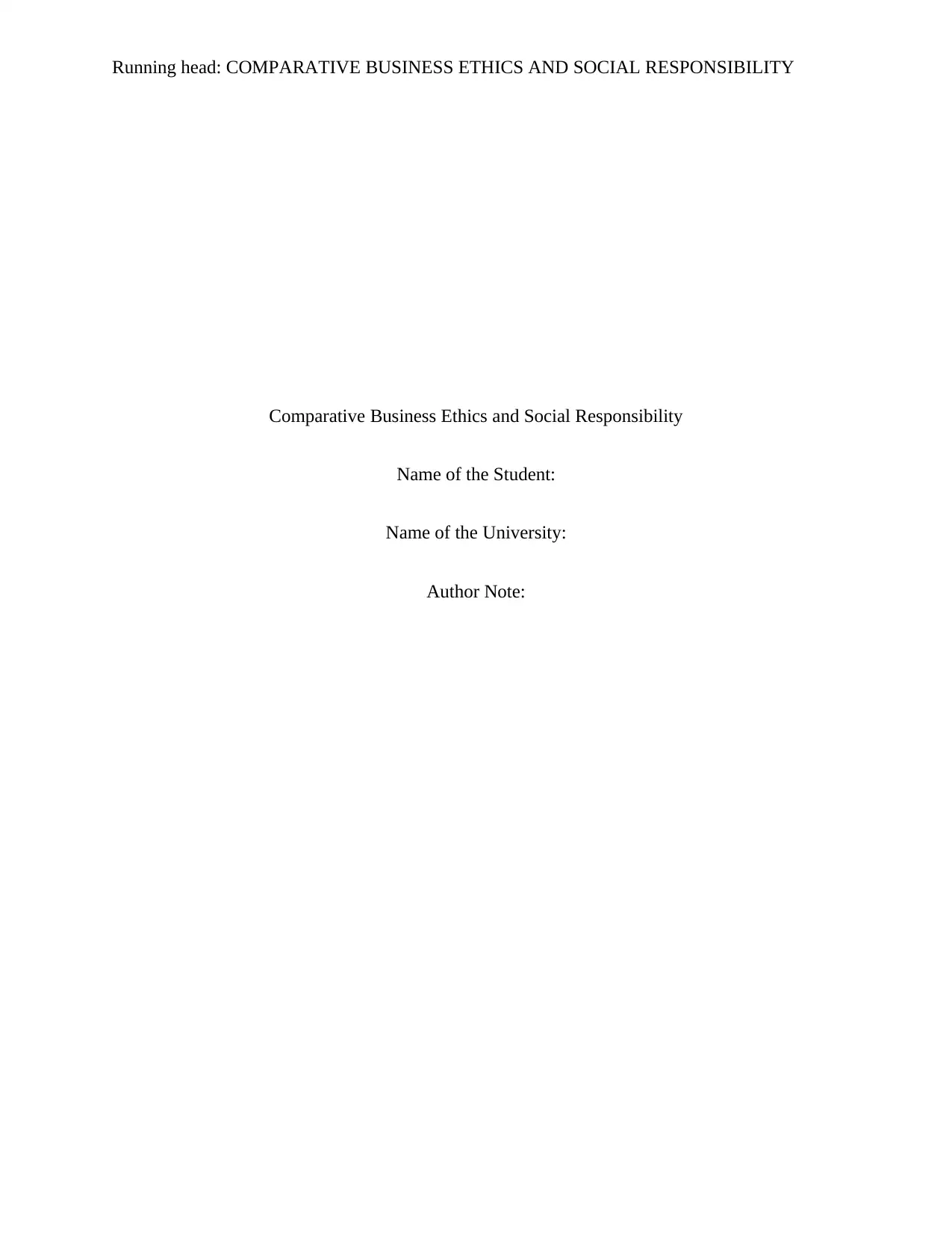
Running head: COMPARATIVE BUSINESS ETHICS AND SOCIAL RESPONSIBILITY
Comparative Business Ethics and Social Responsibility
Name of the Student:
Name of the University:
Author Note:
Comparative Business Ethics and Social Responsibility
Name of the Student:
Name of the University:
Author Note:
Paraphrase This Document
Need a fresh take? Get an instant paraphrase of this document with our AI Paraphraser
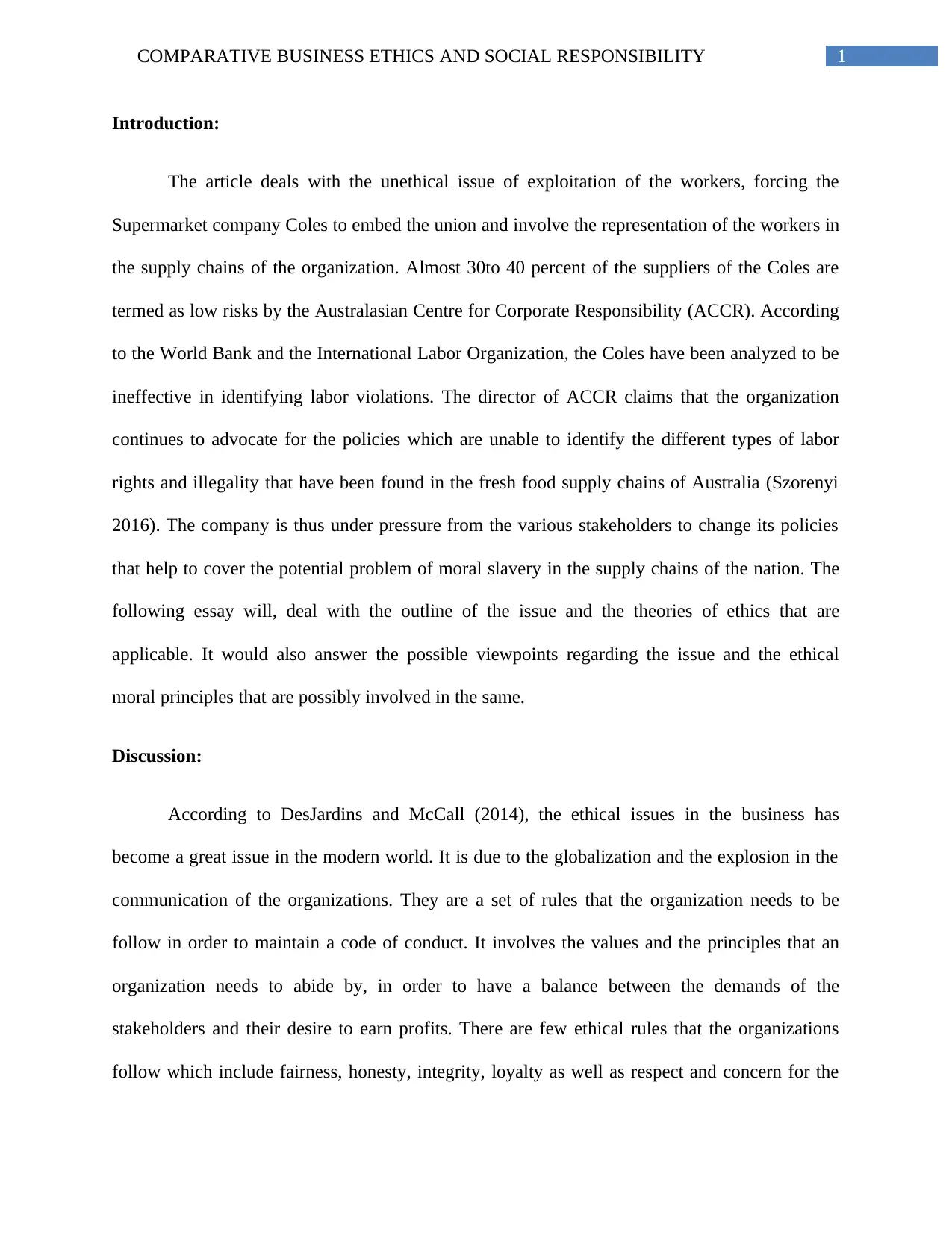
1COMPARATIVE BUSINESS ETHICS AND SOCIAL RESPONSIBILITY
Introduction:
The article deals with the unethical issue of exploitation of the workers, forcing the
Supermarket company Coles to embed the union and involve the representation of the workers in
the supply chains of the organization. Almost 30to 40 percent of the suppliers of the Coles are
termed as low risks by the Australasian Centre for Corporate Responsibility (ACCR). According
to the World Bank and the International Labor Organization, the Coles have been analyzed to be
ineffective in identifying labor violations. The director of ACCR claims that the organization
continues to advocate for the policies which are unable to identify the different types of labor
rights and illegality that have been found in the fresh food supply chains of Australia (Szorenyi
2016). The company is thus under pressure from the various stakeholders to change its policies
that help to cover the potential problem of moral slavery in the supply chains of the nation. The
following essay will, deal with the outline of the issue and the theories of ethics that are
applicable. It would also answer the possible viewpoints regarding the issue and the ethical
moral principles that are possibly involved in the same.
Discussion:
According to DesJardins and McCall (2014), the ethical issues in the business has
become a great issue in the modern world. It is due to the globalization and the explosion in the
communication of the organizations. They are a set of rules that the organization needs to be
follow in order to maintain a code of conduct. It involves the values and the principles that an
organization needs to abide by, in order to have a balance between the demands of the
stakeholders and their desire to earn profits. There are few ethical rules that the organizations
follow which include fairness, honesty, integrity, loyalty as well as respect and concern for the
Introduction:
The article deals with the unethical issue of exploitation of the workers, forcing the
Supermarket company Coles to embed the union and involve the representation of the workers in
the supply chains of the organization. Almost 30to 40 percent of the suppliers of the Coles are
termed as low risks by the Australasian Centre for Corporate Responsibility (ACCR). According
to the World Bank and the International Labor Organization, the Coles have been analyzed to be
ineffective in identifying labor violations. The director of ACCR claims that the organization
continues to advocate for the policies which are unable to identify the different types of labor
rights and illegality that have been found in the fresh food supply chains of Australia (Szorenyi
2016). The company is thus under pressure from the various stakeholders to change its policies
that help to cover the potential problem of moral slavery in the supply chains of the nation. The
following essay will, deal with the outline of the issue and the theories of ethics that are
applicable. It would also answer the possible viewpoints regarding the issue and the ethical
moral principles that are possibly involved in the same.
Discussion:
According to DesJardins and McCall (2014), the ethical issues in the business has
become a great issue in the modern world. It is due to the globalization and the explosion in the
communication of the organizations. They are a set of rules that the organization needs to be
follow in order to maintain a code of conduct. It involves the values and the principles that an
organization needs to abide by, in order to have a balance between the demands of the
stakeholders and their desire to earn profits. There are few ethical rules that the organizations
follow which include fairness, honesty, integrity, loyalty as well as respect and concern for the
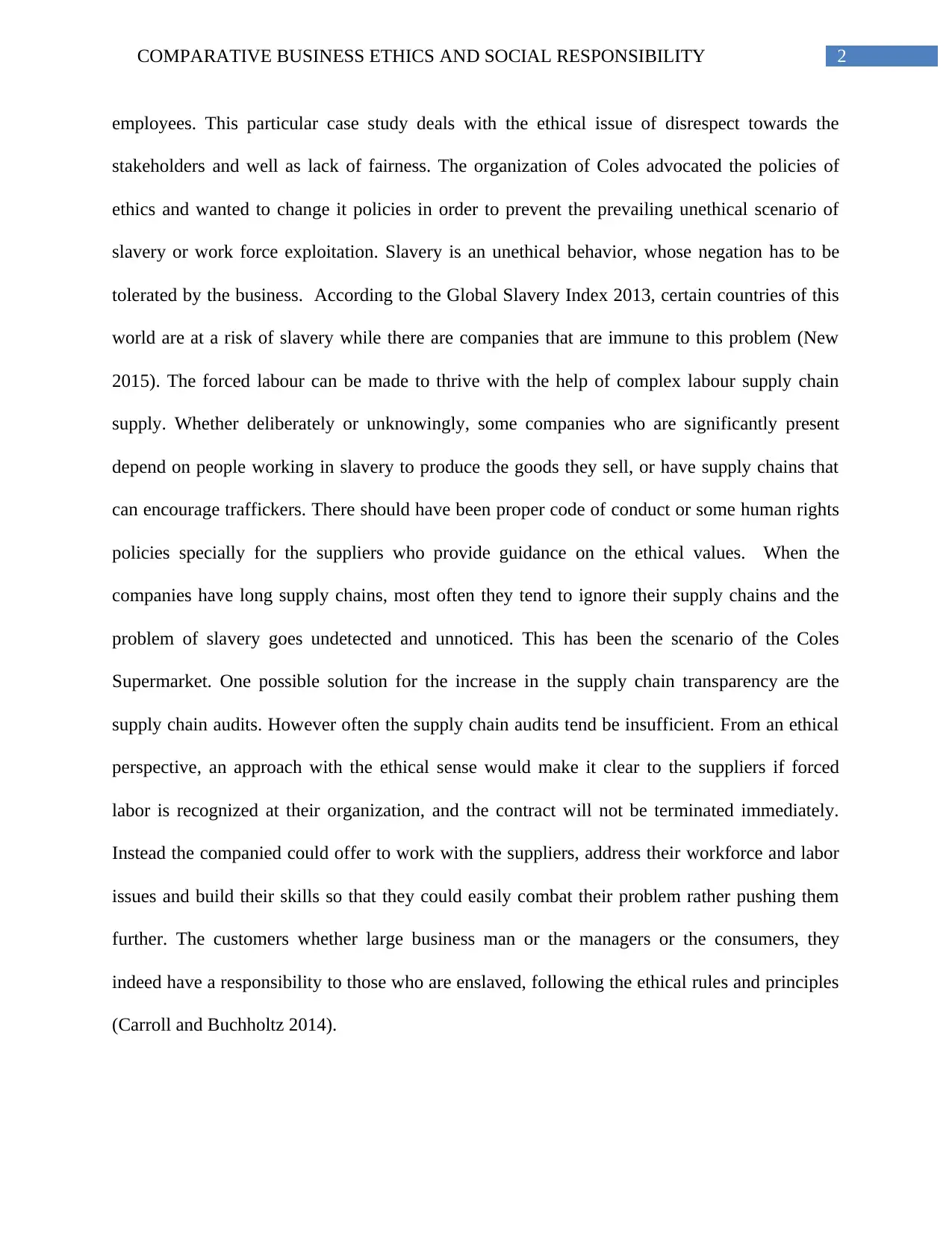
2COMPARATIVE BUSINESS ETHICS AND SOCIAL RESPONSIBILITY
employees. This particular case study deals with the ethical issue of disrespect towards the
stakeholders and well as lack of fairness. The organization of Coles advocated the policies of
ethics and wanted to change it policies in order to prevent the prevailing unethical scenario of
slavery or work force exploitation. Slavery is an unethical behavior, whose negation has to be
tolerated by the business. According to the Global Slavery Index 2013, certain countries of this
world are at a risk of slavery while there are companies that are immune to this problem (New
2015). The forced labour can be made to thrive with the help of complex labour supply chain
supply. Whether deliberately or unknowingly, some companies who are significantly present
depend on people working in slavery to produce the goods they sell, or have supply chains that
can encourage traffickers. There should have been proper code of conduct or some human rights
policies specially for the suppliers who provide guidance on the ethical values. When the
companies have long supply chains, most often they tend to ignore their supply chains and the
problem of slavery goes undetected and unnoticed. This has been the scenario of the Coles
Supermarket. One possible solution for the increase in the supply chain transparency are the
supply chain audits. However often the supply chain audits tend be insufficient. From an ethical
perspective, an approach with the ethical sense would make it clear to the suppliers if forced
labor is recognized at their organization, and the contract will not be terminated immediately.
Instead the companied could offer to work with the suppliers, address their workforce and labor
issues and build their skills so that they could easily combat their problem rather pushing them
further. The customers whether large business man or the managers or the consumers, they
indeed have a responsibility to those who are enslaved, following the ethical rules and principles
(Carroll and Buchholtz 2014).
employees. This particular case study deals with the ethical issue of disrespect towards the
stakeholders and well as lack of fairness. The organization of Coles advocated the policies of
ethics and wanted to change it policies in order to prevent the prevailing unethical scenario of
slavery or work force exploitation. Slavery is an unethical behavior, whose negation has to be
tolerated by the business. According to the Global Slavery Index 2013, certain countries of this
world are at a risk of slavery while there are companies that are immune to this problem (New
2015). The forced labour can be made to thrive with the help of complex labour supply chain
supply. Whether deliberately or unknowingly, some companies who are significantly present
depend on people working in slavery to produce the goods they sell, or have supply chains that
can encourage traffickers. There should have been proper code of conduct or some human rights
policies specially for the suppliers who provide guidance on the ethical values. When the
companies have long supply chains, most often they tend to ignore their supply chains and the
problem of slavery goes undetected and unnoticed. This has been the scenario of the Coles
Supermarket. One possible solution for the increase in the supply chain transparency are the
supply chain audits. However often the supply chain audits tend be insufficient. From an ethical
perspective, an approach with the ethical sense would make it clear to the suppliers if forced
labor is recognized at their organization, and the contract will not be terminated immediately.
Instead the companied could offer to work with the suppliers, address their workforce and labor
issues and build their skills so that they could easily combat their problem rather pushing them
further. The customers whether large business man or the managers or the consumers, they
indeed have a responsibility to those who are enslaved, following the ethical rules and principles
(Carroll and Buchholtz 2014).
⊘ This is a preview!⊘
Do you want full access?
Subscribe today to unlock all pages.

Trusted by 1+ million students worldwide
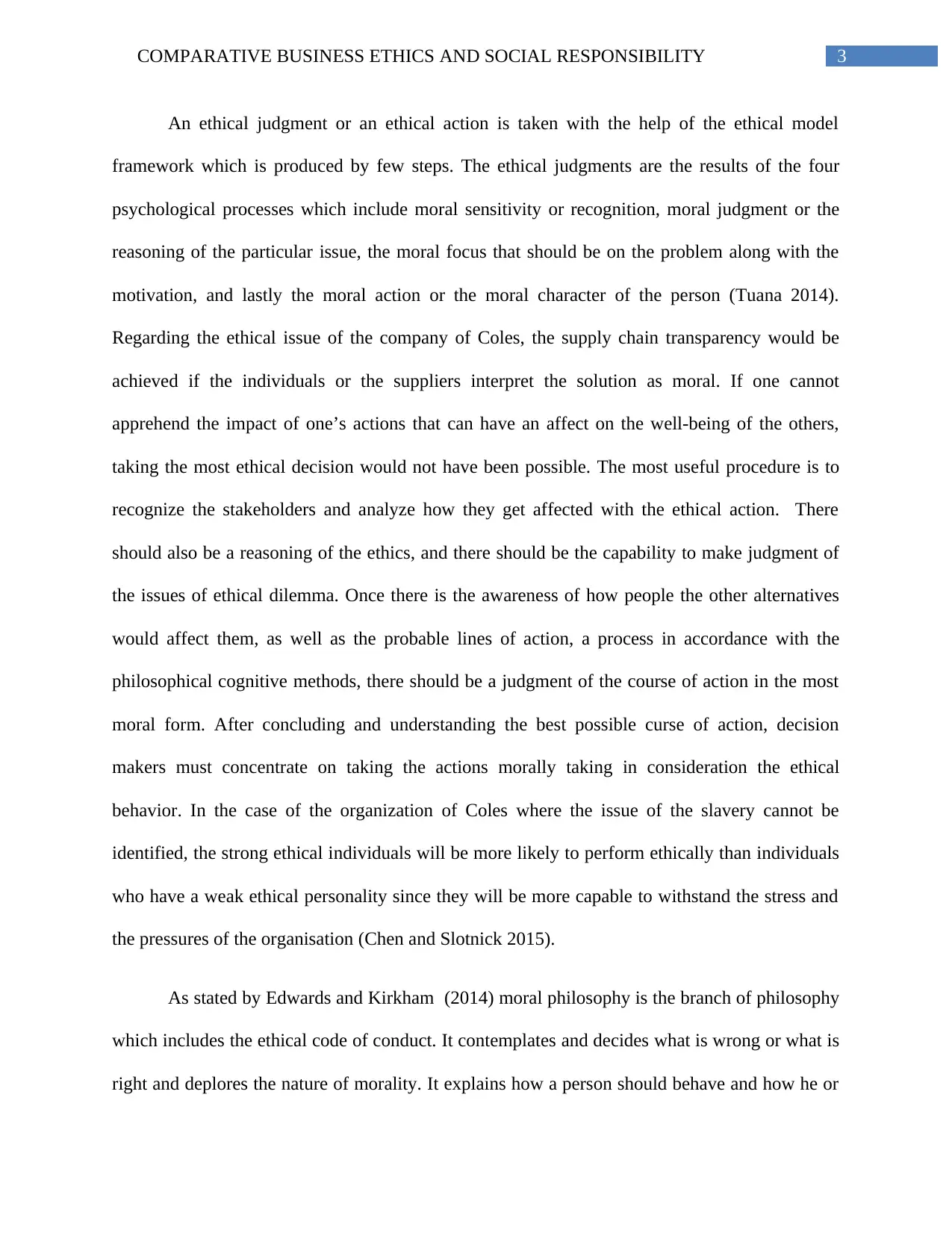
3COMPARATIVE BUSINESS ETHICS AND SOCIAL RESPONSIBILITY
An ethical judgment or an ethical action is taken with the help of the ethical model
framework which is produced by few steps. The ethical judgments are the results of the four
psychological processes which include moral sensitivity or recognition, moral judgment or the
reasoning of the particular issue, the moral focus that should be on the problem along with the
motivation, and lastly the moral action or the moral character of the person (Tuana 2014).
Regarding the ethical issue of the company of Coles, the supply chain transparency would be
achieved if the individuals or the suppliers interpret the solution as moral. If one cannot
apprehend the impact of one’s actions that can have an affect on the well-being of the others,
taking the most ethical decision would not have been possible. The most useful procedure is to
recognize the stakeholders and analyze how they get affected with the ethical action. There
should also be a reasoning of the ethics, and there should be the capability to make judgment of
the issues of ethical dilemma. Once there is the awareness of how people the other alternatives
would affect them, as well as the probable lines of action, a process in accordance with the
philosophical cognitive methods, there should be a judgment of the course of action in the most
moral form. After concluding and understanding the best possible curse of action, decision
makers must concentrate on taking the actions morally taking in consideration the ethical
behavior. In the case of the organization of Coles where the issue of the slavery cannot be
identified, the strong ethical individuals will be more likely to perform ethically than individuals
who have a weak ethical personality since they will be more capable to withstand the stress and
the pressures of the organisation (Chen and Slotnick 2015).
As stated by Edwards and Kirkham (2014) moral philosophy is the branch of philosophy
which includes the ethical code of conduct. It contemplates and decides what is wrong or what is
right and deplores the nature of morality. It explains how a person should behave and how he or
An ethical judgment or an ethical action is taken with the help of the ethical model
framework which is produced by few steps. The ethical judgments are the results of the four
psychological processes which include moral sensitivity or recognition, moral judgment or the
reasoning of the particular issue, the moral focus that should be on the problem along with the
motivation, and lastly the moral action or the moral character of the person (Tuana 2014).
Regarding the ethical issue of the company of Coles, the supply chain transparency would be
achieved if the individuals or the suppliers interpret the solution as moral. If one cannot
apprehend the impact of one’s actions that can have an affect on the well-being of the others,
taking the most ethical decision would not have been possible. The most useful procedure is to
recognize the stakeholders and analyze how they get affected with the ethical action. There
should also be a reasoning of the ethics, and there should be the capability to make judgment of
the issues of ethical dilemma. Once there is the awareness of how people the other alternatives
would affect them, as well as the probable lines of action, a process in accordance with the
philosophical cognitive methods, there should be a judgment of the course of action in the most
moral form. After concluding and understanding the best possible curse of action, decision
makers must concentrate on taking the actions morally taking in consideration the ethical
behavior. In the case of the organization of Coles where the issue of the slavery cannot be
identified, the strong ethical individuals will be more likely to perform ethically than individuals
who have a weak ethical personality since they will be more capable to withstand the stress and
the pressures of the organisation (Chen and Slotnick 2015).
As stated by Edwards and Kirkham (2014) moral philosophy is the branch of philosophy
which includes the ethical code of conduct. It contemplates and decides what is wrong or what is
right and deplores the nature of morality. It explains how a person should behave and how he or
Paraphrase This Document
Need a fresh take? Get an instant paraphrase of this document with our AI Paraphraser
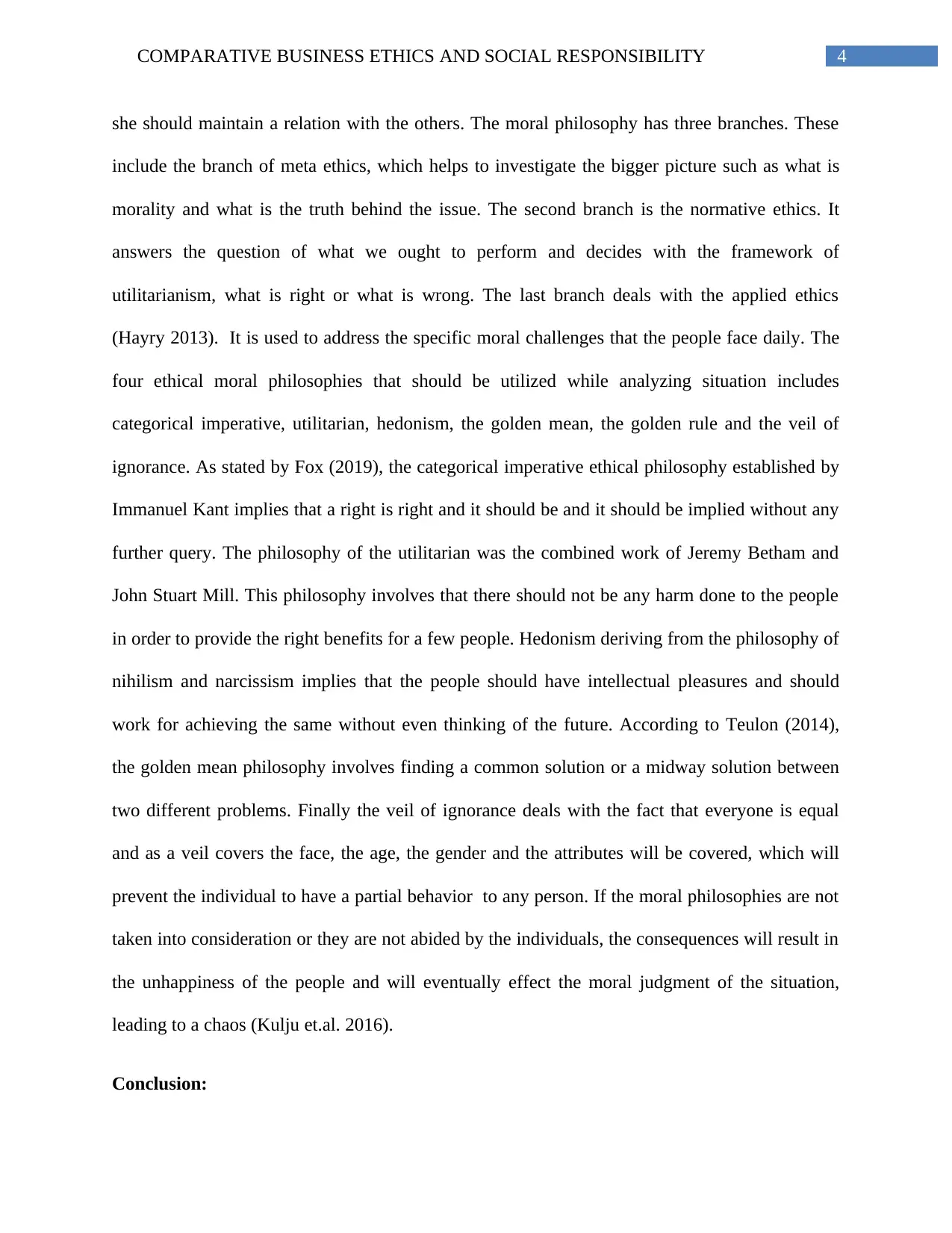
4COMPARATIVE BUSINESS ETHICS AND SOCIAL RESPONSIBILITY
she should maintain a relation with the others. The moral philosophy has three branches. These
include the branch of meta ethics, which helps to investigate the bigger picture such as what is
morality and what is the truth behind the issue. The second branch is the normative ethics. It
answers the question of what we ought to perform and decides with the framework of
utilitarianism, what is right or what is wrong. The last branch deals with the applied ethics
(Hayry 2013). It is used to address the specific moral challenges that the people face daily. The
four ethical moral philosophies that should be utilized while analyzing situation includes
categorical imperative, utilitarian, hedonism, the golden mean, the golden rule and the veil of
ignorance. As stated by Fox (2019), the categorical imperative ethical philosophy established by
Immanuel Kant implies that a right is right and it should be and it should be implied without any
further query. The philosophy of the utilitarian was the combined work of Jeremy Betham and
John Stuart Mill. This philosophy involves that there should not be any harm done to the people
in order to provide the right benefits for a few people. Hedonism deriving from the philosophy of
nihilism and narcissism implies that the people should have intellectual pleasures and should
work for achieving the same without even thinking of the future. According to Teulon (2014),
the golden mean philosophy involves finding a common solution or a midway solution between
two different problems. Finally the veil of ignorance deals with the fact that everyone is equal
and as a veil covers the face, the age, the gender and the attributes will be covered, which will
prevent the individual to have a partial behavior to any person. If the moral philosophies are not
taken into consideration or they are not abided by the individuals, the consequences will result in
the unhappiness of the people and will eventually effect the moral judgment of the situation,
leading to a chaos (Kulju et.al. 2016).
Conclusion:
she should maintain a relation with the others. The moral philosophy has three branches. These
include the branch of meta ethics, which helps to investigate the bigger picture such as what is
morality and what is the truth behind the issue. The second branch is the normative ethics. It
answers the question of what we ought to perform and decides with the framework of
utilitarianism, what is right or what is wrong. The last branch deals with the applied ethics
(Hayry 2013). It is used to address the specific moral challenges that the people face daily. The
four ethical moral philosophies that should be utilized while analyzing situation includes
categorical imperative, utilitarian, hedonism, the golden mean, the golden rule and the veil of
ignorance. As stated by Fox (2019), the categorical imperative ethical philosophy established by
Immanuel Kant implies that a right is right and it should be and it should be implied without any
further query. The philosophy of the utilitarian was the combined work of Jeremy Betham and
John Stuart Mill. This philosophy involves that there should not be any harm done to the people
in order to provide the right benefits for a few people. Hedonism deriving from the philosophy of
nihilism and narcissism implies that the people should have intellectual pleasures and should
work for achieving the same without even thinking of the future. According to Teulon (2014),
the golden mean philosophy involves finding a common solution or a midway solution between
two different problems. Finally the veil of ignorance deals with the fact that everyone is equal
and as a veil covers the face, the age, the gender and the attributes will be covered, which will
prevent the individual to have a partial behavior to any person. If the moral philosophies are not
taken into consideration or they are not abided by the individuals, the consequences will result in
the unhappiness of the people and will eventually effect the moral judgment of the situation,
leading to a chaos (Kulju et.al. 2016).
Conclusion:
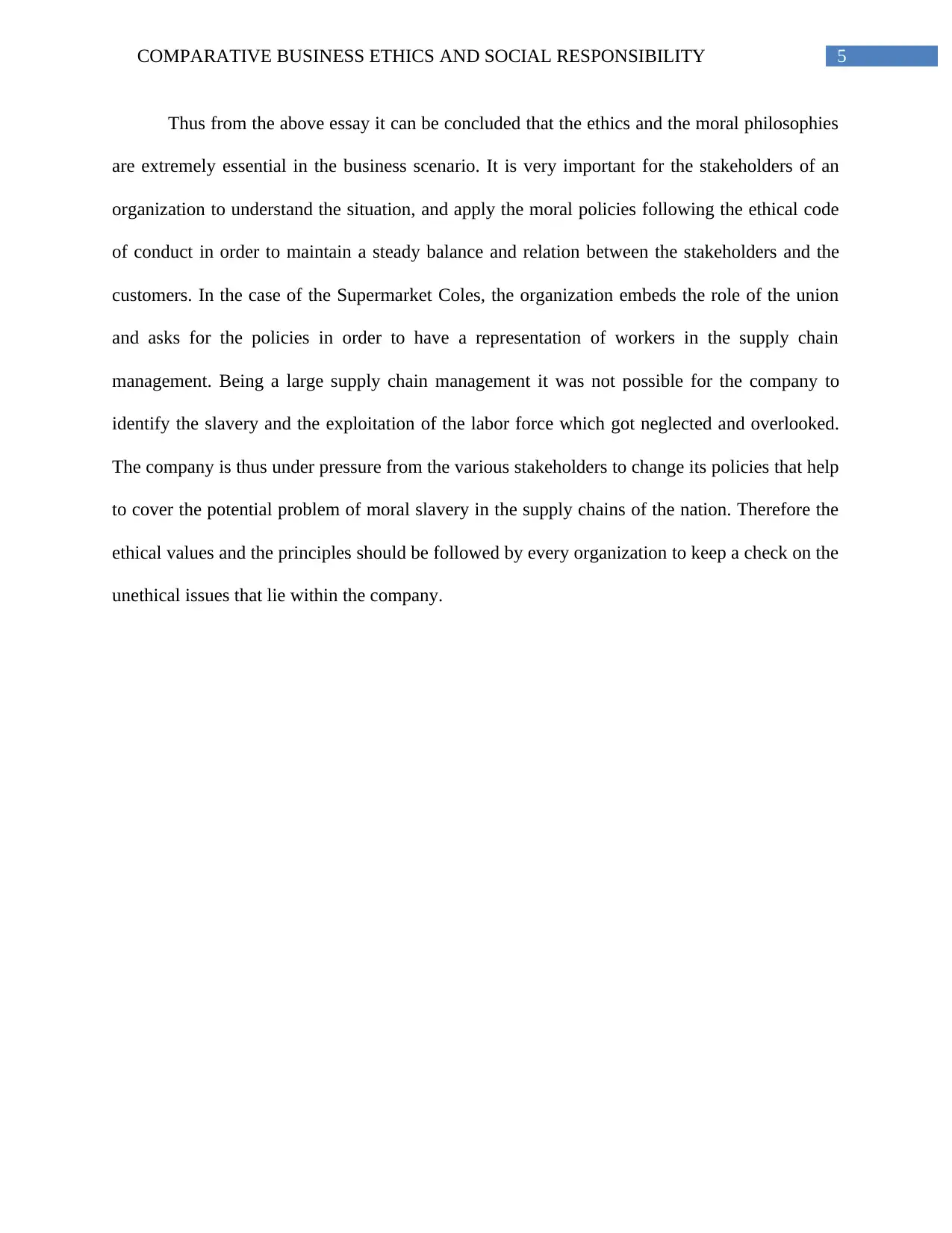
5COMPARATIVE BUSINESS ETHICS AND SOCIAL RESPONSIBILITY
Thus from the above essay it can be concluded that the ethics and the moral philosophies
are extremely essential in the business scenario. It is very important for the stakeholders of an
organization to understand the situation, and apply the moral policies following the ethical code
of conduct in order to maintain a steady balance and relation between the stakeholders and the
customers. In the case of the Supermarket Coles, the organization embeds the role of the union
and asks for the policies in order to have a representation of workers in the supply chain
management. Being a large supply chain management it was not possible for the company to
identify the slavery and the exploitation of the labor force which got neglected and overlooked.
The company is thus under pressure from the various stakeholders to change its policies that help
to cover the potential problem of moral slavery in the supply chains of the nation. Therefore the
ethical values and the principles should be followed by every organization to keep a check on the
unethical issues that lie within the company.
Thus from the above essay it can be concluded that the ethics and the moral philosophies
are extremely essential in the business scenario. It is very important for the stakeholders of an
organization to understand the situation, and apply the moral policies following the ethical code
of conduct in order to maintain a steady balance and relation between the stakeholders and the
customers. In the case of the Supermarket Coles, the organization embeds the role of the union
and asks for the policies in order to have a representation of workers in the supply chain
management. Being a large supply chain management it was not possible for the company to
identify the slavery and the exploitation of the labor force which got neglected and overlooked.
The company is thus under pressure from the various stakeholders to change its policies that help
to cover the potential problem of moral slavery in the supply chains of the nation. Therefore the
ethical values and the principles should be followed by every organization to keep a check on the
unethical issues that lie within the company.
⊘ This is a preview!⊘
Do you want full access?
Subscribe today to unlock all pages.

Trusted by 1+ million students worldwide
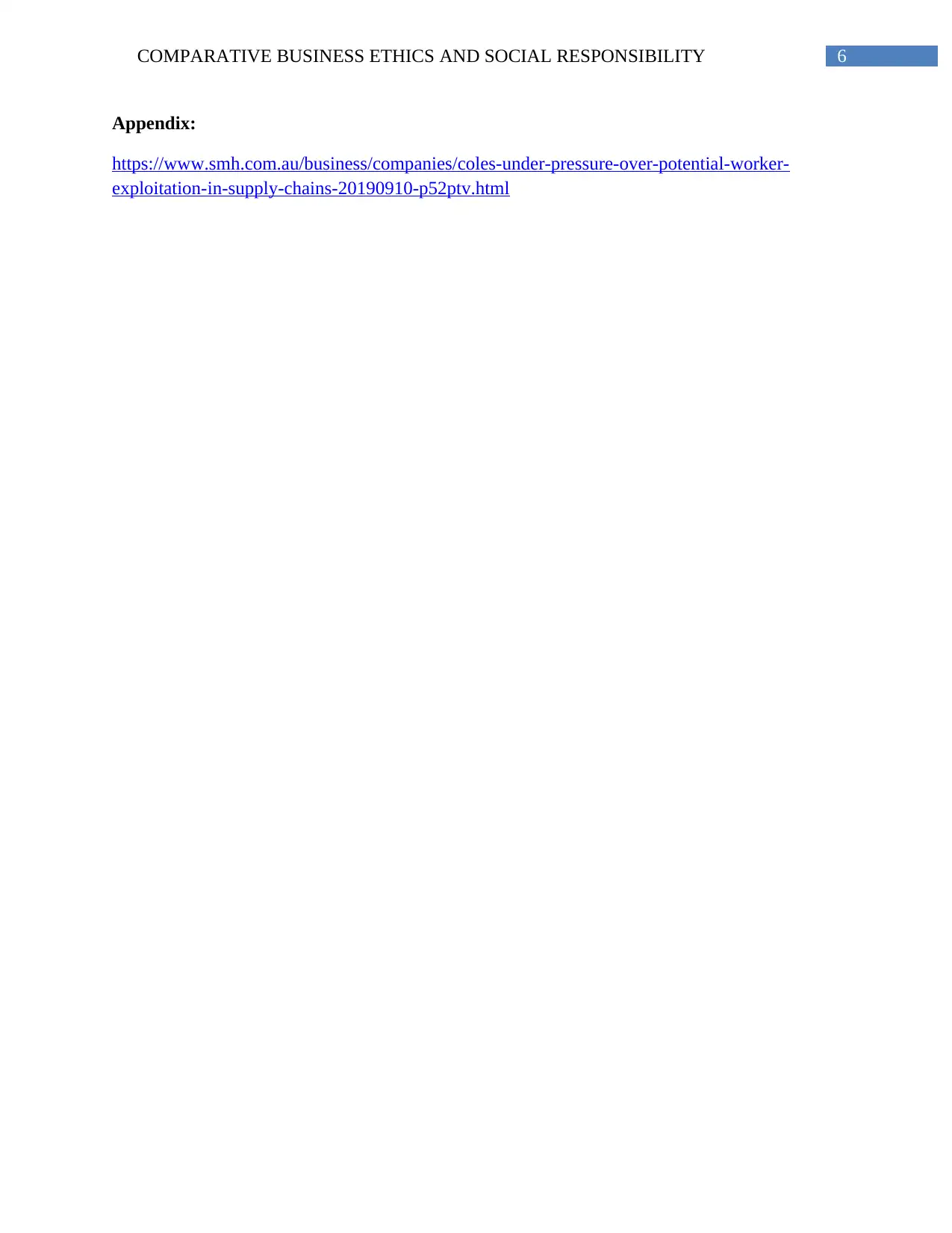
6COMPARATIVE BUSINESS ETHICS AND SOCIAL RESPONSIBILITY
Appendix:
https://www.smh.com.au/business/companies/coles-under-pressure-over-potential-worker-
exploitation-in-supply-chains-20190910-p52ptv.html
Appendix:
https://www.smh.com.au/business/companies/coles-under-pressure-over-potential-worker-
exploitation-in-supply-chains-20190910-p52ptv.html
Paraphrase This Document
Need a fresh take? Get an instant paraphrase of this document with our AI Paraphraser
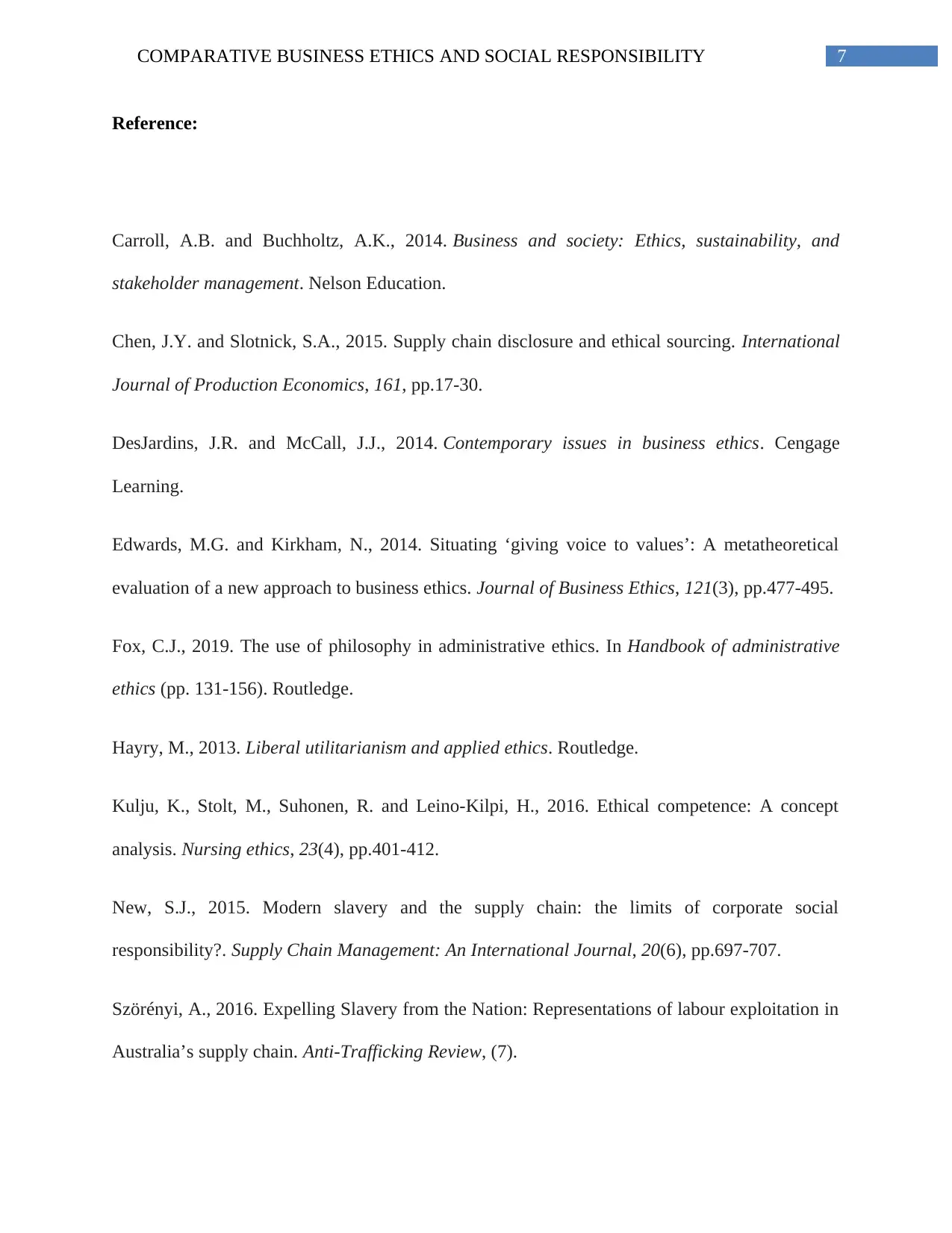
7COMPARATIVE BUSINESS ETHICS AND SOCIAL RESPONSIBILITY
Reference:
Carroll, A.B. and Buchholtz, A.K., 2014. Business and society: Ethics, sustainability, and
stakeholder management. Nelson Education.
Chen, J.Y. and Slotnick, S.A., 2015. Supply chain disclosure and ethical sourcing. International
Journal of Production Economics, 161, pp.17-30.
DesJardins, J.R. and McCall, J.J., 2014. Contemporary issues in business ethics. Cengage
Learning.
Edwards, M.G. and Kirkham, N., 2014. Situating ‘giving voice to values’: A metatheoretical
evaluation of a new approach to business ethics. Journal of Business Ethics, 121(3), pp.477-495.
Fox, C.J., 2019. The use of philosophy in administrative ethics. In Handbook of administrative
ethics (pp. 131-156). Routledge.
Hayry, M., 2013. Liberal utilitarianism and applied ethics. Routledge.
Kulju, K., Stolt, M., Suhonen, R. and Leino-Kilpi, H., 2016. Ethical competence: A concept
analysis. Nursing ethics, 23(4), pp.401-412.
New, S.J., 2015. Modern slavery and the supply chain: the limits of corporate social
responsibility?. Supply Chain Management: An International Journal, 20(6), pp.697-707.
Szörényi, A., 2016. Expelling Slavery from the Nation: Representations of labour exploitation in
Australia’s supply chain. Anti-Trafficking Review, (7).
Reference:
Carroll, A.B. and Buchholtz, A.K., 2014. Business and society: Ethics, sustainability, and
stakeholder management. Nelson Education.
Chen, J.Y. and Slotnick, S.A., 2015. Supply chain disclosure and ethical sourcing. International
Journal of Production Economics, 161, pp.17-30.
DesJardins, J.R. and McCall, J.J., 2014. Contemporary issues in business ethics. Cengage
Learning.
Edwards, M.G. and Kirkham, N., 2014. Situating ‘giving voice to values’: A metatheoretical
evaluation of a new approach to business ethics. Journal of Business Ethics, 121(3), pp.477-495.
Fox, C.J., 2019. The use of philosophy in administrative ethics. In Handbook of administrative
ethics (pp. 131-156). Routledge.
Hayry, M., 2013. Liberal utilitarianism and applied ethics. Routledge.
Kulju, K., Stolt, M., Suhonen, R. and Leino-Kilpi, H., 2016. Ethical competence: A concept
analysis. Nursing ethics, 23(4), pp.401-412.
New, S.J., 2015. Modern slavery and the supply chain: the limits of corporate social
responsibility?. Supply Chain Management: An International Journal, 20(6), pp.697-707.
Szörényi, A., 2016. Expelling Slavery from the Nation: Representations of labour exploitation in
Australia’s supply chain. Anti-Trafficking Review, (7).
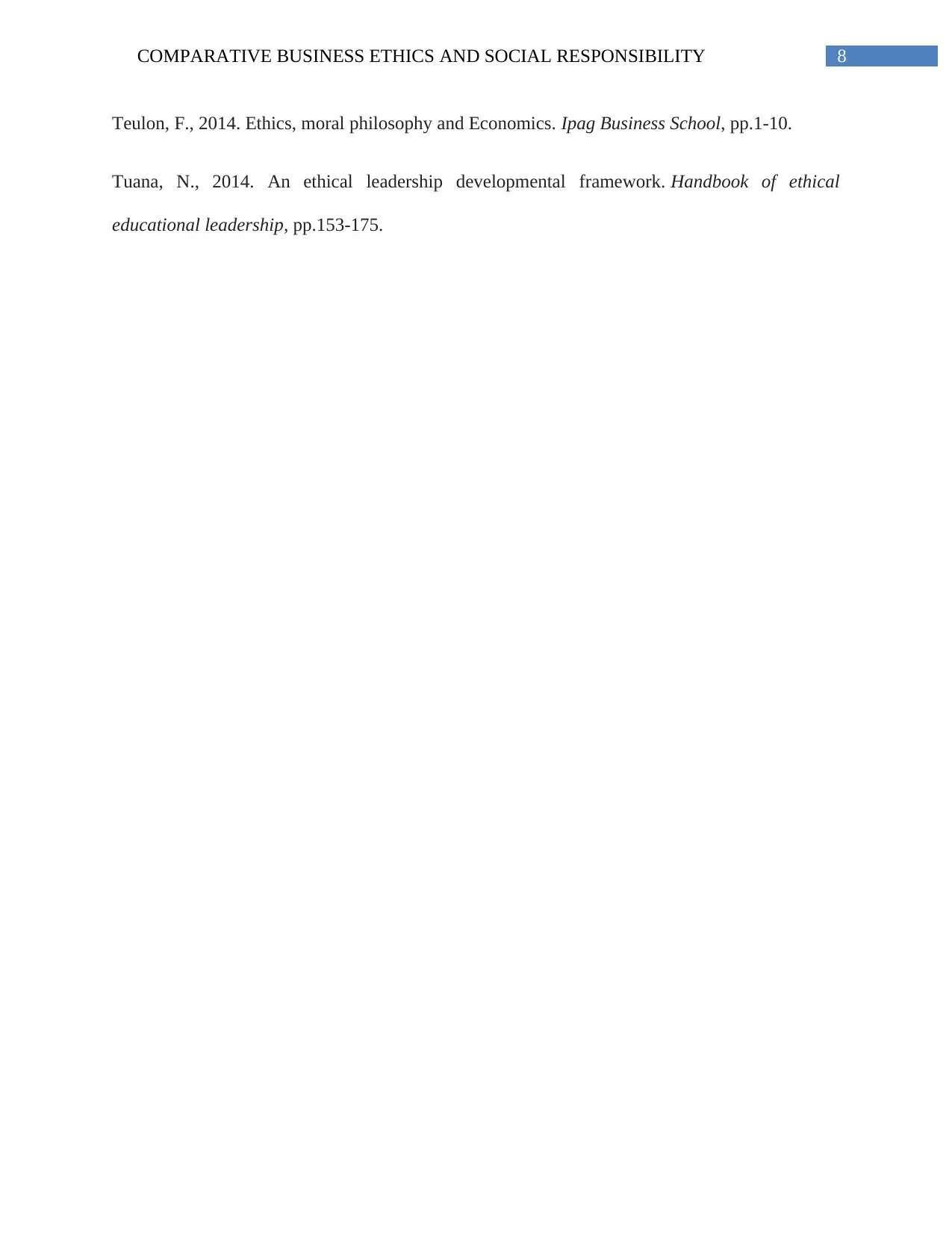
8COMPARATIVE BUSINESS ETHICS AND SOCIAL RESPONSIBILITY
Teulon, F., 2014. Ethics, moral philosophy and Economics. Ipag Business School, pp.1-10.
Tuana, N., 2014. An ethical leadership developmental framework. Handbook of ethical
educational leadership, pp.153-175.
Teulon, F., 2014. Ethics, moral philosophy and Economics. Ipag Business School, pp.1-10.
Tuana, N., 2014. An ethical leadership developmental framework. Handbook of ethical
educational leadership, pp.153-175.
⊘ This is a preview!⊘
Do you want full access?
Subscribe today to unlock all pages.

Trusted by 1+ million students worldwide
1 out of 9
Related Documents
Your All-in-One AI-Powered Toolkit for Academic Success.
+13062052269
info@desklib.com
Available 24*7 on WhatsApp / Email
![[object Object]](/_next/static/media/star-bottom.7253800d.svg)
Unlock your academic potential
Copyright © 2020–2026 A2Z Services. All Rights Reserved. Developed and managed by ZUCOL.




